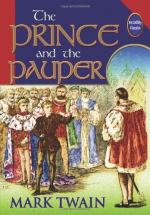The elderly heads nodded recognition of Tom’s wisdom once more, and one individual murmured, “An’ the King be mad himself, according to report, then is it a madness of a sort that would improve the sanity of some I wot of, if by the gentle providence of God they could but catch it.”
“What age hath the child?” asked Tom.
“Nine years, please your Majesty.”
“By the law of England may a child enter into covenant and sell itself, my lord?” asked Tom, turning to a learned judge.
“The law doth not permit a child to make or meddle in any weighty matter, good my liege, holding that its callow wit unfitteth it to cope with the riper wit and evil schemings of them that are its elders. The devil may buy a child, if he so choose, and the child agree thereto, but not an Englishman—in this latter case the contract would be null and void.”
“It seemeth a rude unchristian thing, and ill contrived, that English law denieth privileges to Englishmen to waste them on the devil!” cried Tom, with honest heat.
This novel view of the matter excited many smiles, and was stored away in many heads to be repeated about the Court as evidence of Tom’s originality as well as progress toward mental health.
The elder culprit had ceased from sobbing, and was hanging upon Tom’s words with an excited interest and a growing hope. Tom noticed this, and it strongly inclined his sympathies toward her in her perilous and unfriended situation. Presently he asked—
“How wrought they to bring the storm?”
“By pulling off their stockings, sire.”
This astonished Tom, and also fired his curiosity to fever heat. He said, eagerly—
“It is wonderful! Hath it always this dread effect?”
“Always, my liege—at least if the woman desire it, and utter the needful words, either in her mind or with her tongue.”
Tom turned to the woman, and said with impetuous zeal—
“Exert thy power—I would see a storm!”
There was a sudden paling of cheeks in the superstitious assemblage, and a general, though unexpressed, desire to get out of the place—all of which was lost upon Tom, who was dead to everything but the proposed cataclysm. Seeing a puzzled and astonished look in the woman’s face, he added, excitedly—
“Never fear—thou shalt be blameless. More—thou shalt go free—none shall touch thee. Exert thy power.”
“Oh, my lord the King, I have it not—I have been falsely accused.”
“Thy fears stay thee. Be of good heart, thou shalt suffer no harm. Make a storm—it mattereth not how small a one—I require nought great or harmful, but indeed prefer the opposite—do this and thy life is spared —thou shalt go out free, with thy child, bearing the King’s pardon, and safe from hurt or malice from any in the realm.”
The woman prostrated herself, and protested, with tears, that she had no power to do the miracle, else she would gladly win her child’s life alone, and be content to lose her own, if by obedience to the King’s command so precious a grace might be acquired.




